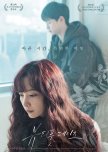
Intensive. Rough. Monosyllabic. If you don't let that put you off: Definitely worth seeing!
On average, every month (!) around 1,000 North Koreans flee to China in the hope of thus escaping hunger and persecution. Around 80 percent of the refugees are women. In many respects they are dependent on their unfamiliar environment - due to the uncertainty regarding residence law they practically live in a legal vacuum. Their fate all too often ends in the hands of smugglers and human traffickers who shamelessly exploit their insecure situation and ruthlessly make use of this for their own profit. The women are kept in brothels under slave-like conditions or forced into marriage. The bribes are increasing in view of tightened border controls. And unfortunately, China delivers all the refugees it identifies as such back to North Korea, where they then await torture and death. They live in constant fear of attacks, violence and deportation."Beautiful Days" tells the true story of a North Korean woman who makes it out of fear and dependency into an independent identity and a new life in South Korea. Her new life not rosy either, but it's free and self-determined.
Lee Na-young convinces here in a true-to-life and unembellished depiction of a bitter, merciless development process - from the abandoned teenager, who is forced into sex work and marriage, who is then threatened with taking her child away to sell it, and then despite all the hopelessness, persistently and unswervingly manages to escape her pimp, emancipate herself and earn enough money as an independent woman to support her family in China from afar.
By the way: In "Beautiful Days" there are actually no "beautiful" days. The title is pure irony. Dialogues are minimized. There is hardly any room for closeness and tenderness in this rough, monosyllabic world. The few loving gestures can practically be counted on one hand, but their effect is thus even stronger.
Intensive. Rough. If you don't let that put you off: Definitely worth seeing!
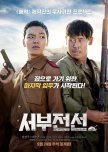
Tackling the horrors of war and the absurdity of the Korean War in particular with grotesque humor
"The Long Way Home" – original: "Western Front" - is a KMovie about the Korean War. But a funny one... if a movie about war might be called funny at all... In fact, it succeeded brilliantly in tackling the horrors of war in general and the absurdity of the Korean War in particular with grotesque humor.As a last resort, even a North Korean student is drafted to drive a tank into battle. A South Korean farmer, in turn, has to leave his heavily pregnant wife behind in order to take part in an all-important, top-secret mission and deliver strategically important secret information to the Allies. Neither are heroes. Neither of them would actually care about the war. But both have dutifully learned the ideological phrases of their 'side' and both, quite by chance, are the only ones in their respective units to survive in an airstrike three days before the truce is signed. The North Korean incidentally stumbles upon the top secret paper and hides it. The South Korean incidentally overwhelms the North Korean... obviously, neither of them being born to be soldiers.
"The Long Way Home" is a kind of road movie back and forth through the empty landscape of the western front line. The student from the north wants to return home with his tank. The farmer from the south, in turn, wants to hand over the secret paper so that he can finally return to his wife and newborn baby. Eventually, sometimes one pulls in this direction and then the other one in that. Only a cow is involved, too. And a bizarre village community in no man's land. Along the way, the two squabblers also stumble upon Chinese troops reinforcing the north, and there is also another airstrike from the south. Then, again and again the cow in the vastness of the natural landscape, in which military equipment and soldiers don´t seem to fit in at all. The war is increasingly losing its meaning and significance. The tank has long been junk anyway, but ironically it becomes their shared cozy home. Enmity becomes friendship. War is crap. This one anyway! Regarding its fatal futility and arbitrariness, the KMovie in conclusion actually goes one better, too.
In "The Long Way Home" infernal war scenarios and powerful chamber drama collide with slapstick and situational comedy. A daring mixture, but quite successful not least thanks to strong mimes - with young talent Yeo Jin-goo and veteran Sol Kyun-gu in a fantastic playing mood.
A different kind of anti-(Korea) war movie.
Not a milestone in cinematics, but quite entertaining in its bizarreness.
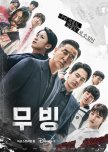
A blockbuster among Disney+ Series. Action driven, yet luckily with subtle character portraits, too
"Moving" is about people with superpowers. “Moving” tells the stories of a variety of people with such superpowers. These superpowers definitely belong to the realm of fantasy. However, it´s nothing like the 'Marvel' universe, because despite all the action spectacle that "Moving" has to offer, this Disney+ production (based on a successful South Korean webtoon) remains true to the KDrama habitus, that life takes place in the area BETWEEN black and white. It's about shades of gray. Nobody is exclusively good or evil. Well, almost nobody...“Moving” takes aim at South Korea’s intelligence policy. The KCIA, which became the ANSP and was eventually called the NIS. The connections with the USA and the difficult relationship with North Korea come into play. Difficult, because even within the framework of an official sunshine policy, distrust and hostility are always maintained in the background.
The South Korean secret service has been part of the international elite since the KCIA was founded. The superpowers of the protagonists may be symbolic of this. The name of the secret service has changed several times, as has its official focus. However, this does not mean that the entire workforce can be replaced...
“Moving” finds its balance between political thriller, action thriller and emotionally differentiated Korean habitus. The trick: the tough agents become humanly tangible because they are also parents, worried about their children. And then another trick: the children have inherited their parents' super-powers, but have not (yet) undergone any agent programming. They are children, still relatively naive, pubescent, too...
Worlds collide. The worlds of those, who behind the curtain want to move the world in their favor (for the sake of so called bigger picture and a safer world), the worlds of those executives, more or less blindly obedient (Black Ops) agents who are needed to succeed with their missions, and the world of those, who actually make this world worth living - people with their ordinary families and social relationships.
“Moving” has 20 episodes. Numerous character and relationship portraits are drawn, all of which are somehow intertwined - the old and the young, yesterday and today. And finally altogether now for a tomorrow free from deadly intelligence agency demands.
“Moving” is, first and foremost, a KDrama with a top-class casting that aims to offer streaming delight at the highest international level. “Moving” is explicitly seen as a kind of blockbuster among Disney+ series productions - with a correspondingly hefty budget. As such, the series has entered the streaming market in a self-assured manner and immediately achieved remarkable success worldwide...
However, for my personal taste, this KDrama comes across as a bit too action driven and brutal - with those superpowerful men and women, who (despite their deadly wounds) keep bouncing back again and again and again... I might have dropped it, if not for this variety of subtle and affectionate character portraits, that make a great part of the story, too.
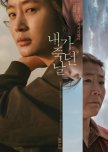
Atypical, yet worthwhile thriller, driven by a unique variety & sensitive quality of women´s power
"The Day I Died: Unclosed Case" is a thriller. However, the KMovie takes its time. It is atmospherically embedded in the slowed down everyday life on an island. The focus is on emotionally approaching the protagonists. In this case, the key characters are all women, who are surrounded by other women. Men are only indirectly involved in the background of the story - among other things as those who stand for the painful wounds in the women's lifes.So you might think: a movie about women's power? As a matter of fact, that's true. However the actual power of women is not men´s power in women's clothes. In this movie, women´s power symbolizes in an idiosyncratic way how the usually devalued "weak" in the 'female' becomes "powerful" and effectively plays out its transforming and liberating quality, yet in a rather calm, descreet variety: silent, subtle, empathetic, unobtrusive.
The story is quite exciting, profound and complex. In the course of the investigation, the detective - strong, competent and at the same time hurt and vulnerable - is increasingly confronted with open questions in her own life. She slowly builds an emotional connection with the missing victim. Although the case seems clear and simple to everyone else, she cannot let it go. She is driven to shed light on injustice of some sort. Is she fighting for the missing victim? Is she fighting for herself? Either way, she finds the answers she's looking for.
In a touching way the strong presence of the two veterans Kim Hye-soo and Lee Jung-eun rounds an exciting story off. Script and direction are also in women's hands here. "The Day I Died: Unclosed Case" is not a classic crime thriller, but definitely worth seeing - with a unique variety and sensitive quality of women´s power.
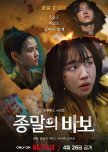
Slow paced & soulful slice of life - HOW we are living being more important than surviving
Beforehand: Anyone who expects "Goodbye Earth" to be a 12 episodes long doomsday blockbuster in the face of an impending apocalypse is completely wrong here. The KDrama has nothing to do with a fast-paced, action-packed and adrenaline-arousing desperate fight against an approaching asteroid.Plus: Yoo Ah-in's lead role, due to a charge of illegal drug use, was reduced to a minimum during production. So somehow it had to be improvised in terms of content. But in my opinion, a stronger focus on the female lead (played by Ahn Eun-jin) didn't hurt.
I would say "Goodbye Earth" is a ´slice of life´ centering around a bunch of rather ordinary people in a rather ordinary residential area in the city of Ungcheon. The remaining city population is expecting the crash of an asteroid that is on a collision course with the Earth and, according to calculations, will hit the Korean peninsula. Other than that, people live their lives - which, compared to before, obviously are not quite the same... So this dystopian KDrama is not about averting disaster. It's about continuing with life - until the end. Together. But, now, what do all the noble, dutiful, corrupt, holy, street-smart, arrogant, simple, life-hungry, in love, pregnant, believing and criminal variations of human beings do with this knowledge of their collective death?
Significantly, the looming asteroid isn't the worst thing at all in “Goodbye Earth”. In this particular scenario, the political order had already largely collapsed. Those who could afford it, had tried to save themselves. Eventually, the power vacuum was filled in no time. But fortunately, "Goodbye Earth" does not medially exploit the dystopian scenario to gleefully indulge into man's cruelty, unscrupulousness and insatiable greed even in the face of the bitter end. In fact, the KDrama gives its time and space mainly to interpersonal dynamics of a certain community - a diverse collection of people, young and old, who know each other from their community life, from school, from childhood. Only over time, little by little, in interspersed flashbacks, do we find out how they are all related to each other and what actually connects them. We walk along with them - during their last days, which are unstoppably shrinking in number… until the collision with the asteroid. Thus, emotionally, episode by episode, we get to know the people and their neighborhood better and might even grow fond of them, too.
The people in Ungcheon are actually less concerned with the approaching asteroid itself than with why and where their priest had disappeared or what had happened to the church money. And then there is this gang of criminals who among others specialized in child trafficking. The pain, fear and hopelessness felt by the people of Ungcheon is more likely to be caused by the collateral damages beforehand of the asteroid collision, than by actually facing their end.
It is slice of life in the context of a rather bizarre, extraordinary life situation. While people have to process their traumatic, crucial life experiences, talking and sharing might actually help to overcome emotional alienation or even frenzy. Yet... This is beautifully demonstrated in several examples. Sooner or later, close to the end the question arises as to what really counts...
In my opinion, this is a quietly gripping and complex KDrama. So complex that a few questions might remain unanswered at the end. But for me they are not so important here, therefore I can leave it at that. I´d say “Goodbye Earth” is rather about the personal processes that all those different characters have to go through, while dealing with those obviously extraordinary challenges their ordinary life is confronting them with.
For all those who expected e.g. “Deep Impact” in a series format, "Goodbye Earth" is certainly disappointing. For fans of slice of life, however, an almost unique scenario opens up in this rare dystopian context. The focus is on a former teacher who had to helplessly watch the children of her mid-school class becoming the greatest collateral damage in the run-up to the asteroid collision. For her this is representing the actual catastrophe.
"Goodbye Earth" lives from subtle interpersonal dynamics, coping with everyday life in a state of emergency and the daily struggles for emotional balance, for humanity and structure, for law and order in the midst of chaos. The KDrama is primarily a soulful and slow-paced study about the people of a neighborhood in Ungcheon bravely continuing with their lives in the light of their definitive collective death date. Because it's not over yet. Well aware about day X, life goes on. Until then. Together.
Bottom line: In the end, HOW we are living is more important, than surviving no matter what.
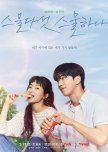
Full of vitality, vigor & inspiration. Love & passion apart from clichés - tender, true & touching
Wonderful. Just wonderful. A highlight among the KDramas of 2022.I would rate it "particularly valuable". On all levels. Right down to the soundtrack.
The story has a stimulating, inspiring, at times downright thrilling effect, above all thanks to a brilliant Kim Tae-ri. She was 32 at the time of shooting, but effortlessly she plays a teenager with an ambitious dream of her own in times of adversity.
"Twenty-Five Twenty-One" is packaged as a teen story told in two timelines. Then and now. The protagonist from back then is today's mother. Today she is at odds with her daughter, who wants to give up her ballet career. In her grandmother's house, the rebellious teenager finds access to her mother's youthful past, who in turn also had difficulties with her mother at the time, yet courageously pursued her dream of becoming a fencer on the national team.
Romantic feelings are inevitable as the story progresses. Yet this storyline develops quite idiosyncratically beyond expectations, not least because of the two timelines told in parallel. Here, Love is shown more in the quality of an inspiring, encouraging, empowering 'rainbow', as the two protagonists so nicely state. It's a shame that you can't leave love like that, but sooner or later want to capture it, tie it down and pack it into a rather common concept of 'partnership' - with all the expectations and disappointments that come along with it...
"Twenty-Five Twenty-One" doesn't see itself as a Rom+/-Com fairy tale. From the start, it's not a fairy tale. Here the goal in life isn´t the happy-ever-after-family-life as such. It tells about what it means to have a dream and to follow it courageously, even if you wonder why at times. It talks about following your own precious heart, even if it might break the hearts of others in the process. It tells of passion. And of love in its very different shapes and sizes. "Twenty-Five Twenty-One" has its unique focus on love in a very tender, true and touching way - apart from clichés. It's about romance as a formative force in life, yet the story doesn't focus on glorifying romance.
In fact, the story is full of vitality, vigor, hope and joie de vivre in the face of one of the worst post-war economic crises South Korea has gone through.
In this respect, the KDrama also offers an explicit insight into the social and societal effects of the economic crisis of the 1990s.
(So here's a also side note on that context, if you are interested.)
-------------------- SIDE NOTE: ---The Asian crisis of the 1990s, the structural adjustment program of the International Monetary Fund (IMF), and the nationalist sentiment of the people that paved the way for South Korea's neoliberal globalization---
In the course of the Asian crisis, the IMF implemented its structural adjustment (SAP) in South Korea from December 1997 to December 2000, which is still considered a great success today. Others say the rise is due to the people's disciplined national consciousness. However, the massive economic slump that South Korea experienced in the vortex of the Asian crisis is undisputed. Neighter ist the impressively successful recovery since 1999.
After international investors withdrew their loans in the face of the uncertain crisis situation on the Asian continent, South Korea fell into a balance of payments crisis. This is where the IMF came into play, putting together its most comprehensive rescue package to date, with bailout loans totaling around USD 58 billion. The condition: the country was to fulfill an SAP program for three years: In addition to a consistent policy of high interest rates, government austerity measures, complex capital market liberalization and the restructuring of the financial system were required.
As a result of the balance of payments crisis, numerous banks had already filed for bankruptcy or had been nationalized. Due to the IMF's high-interest policy, countless corporate insolvencies followed in the first three months of the SAP, including some Jaebeol conglomerates. South Korea paid the price of its economic boom of the past decades, which was founded on high debt and growth rates. Unemployment tripled. Gross domestic product fell by 6.7 percent within a year.
The impressive recovery that has followed has been possible at the expense of the general population. South Korea's rapid return to the top positions in the world market is a special case worldwide, which was probably achieved less by the SAP of the IMF than by the nationalistically highly motivated South Koreans. They have written the possibly questionable, but at the same time fascinating economic success story on their backs.
First: People became victims of far-reaching processes of rationalization and concentration. On the one hand, this led to mass redundancies and, on the other hand, to a more flexible labor market. Many of the demoralized unemployed didn´t even try to find their way back into the world of work anymore. Others were employed as irregular temporary workers (e.g. with less pay, security and rights). After the crisis, these ´irregulars´ made up more than half of the workforce and their share still is far higher than in other OECD countries.
Second: The benefit of a very unique South Korean nationalism motivated many people to be willing to make personal sacrifices: they consciously avoided consuming imported goods, while at the same time the export of their own goods increased significantly. The need for foreign capital for the upswing is actually estimated at only 5 percent. The share of exports in GDP increased from 25 percent in 1996 to 41 percent in 1998. 95 percent of the net inflow of foreign exchange during the lifetime of the SAP came from the current account surplus. This was made possible by a disciplined population, who did not try to storm banks in a mass panic, but were even willing to exchange their private currencies and savings themselves, including in large gold collection campaigns, in favor of the national reserves in the weak national currency.
The macroeconomic success that has grown out of this nationalist attitude at the expense of the population is enormous. Many lost their jobs and their fortunes. Nevertheless, the South Koreans mostly got involved in the Buy-Korean campaign and avoided imported consumer goods. I.E. incidentally, the market share of South Korean films in cinemas has increased in this context from 23 percent in 1996 to 50 percent in 2001. (An aspect that also gets its own space in this KDrama...)
-----------------------------------------
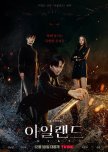
Mythical worlds, demonic realms & human tragedy mixed with luminous impulses + even humorous tones
'Island' is a KDrama released on streaming platform TVing.Alas! The unspeakable bad habit à la Netflix is obviously spreading rapidly: break series into half and then wait a couple of months before the story continues. Really? It's frustrating. Not just for me, obviously. And not for the first time. Same here. KDrama has always been doing great with solidly telling a story in one season, how long it may take... (In that sense, going global turns out to be an unnecessary step backwards.)
I would also like to mention in advance, I was a bit disappointed. Something was missing. A spark of whatsoever. Maybe another streaming-platform-malady: a compact binge-worthy story is often (I think) paying the price by losing some of its intensity. The story doesn't grab me that much, I rather watch. So there's a loss of potential there (I think).
Still it is entertaining to watch and has its moments.
In "Island" time and space become relative in many respects. What the still remembered past is for some, a past, long-forgotten life it is for others. What is a demon for one person can be a human being for another, since both forces are at work. What is 'here' can be a completely different place at the same time. The KDrama provides insights into archaically cruel initiation rites for demon hunters and also presents a contemporary exorcist who combines youthful KPop freshness and traditional priestly garment. There are also the traditional haenyeo - female divers who for ages have been diving just like that for abalone and the like. (After "Everglow" and "Our Blues" Go Doo-shim has probably subscribed to this role for life :-) so it seems...)
Well, demons are rarely a pretty sight when they do show their true colors. Yet, assigning "Island" to the horror genre to me seems exaggerated, as zombies & co. nowadays regularly show multimedia presence. Let's call it fantasy. Still, it's pretty gloomy overall. The night is in no way inferior to the day when it comes to screen time. In addition, some people fall victim to gruesome, demonic transformation processes and sometimes, if possible, hunt for human flesh themselves. The good news: there is no shooting around. Rather, the sword is drawn. Either in forged iron decorated with rich ornaments, or the lightsaber, or the crucifix, which should also not be underestimated thanks to its symbolic power, or - if all else fails or no one else is around - a few movements versed in self defense should do.
(Note: Some may locate the KDrama with its demonically inspired story in the world of fairy tales. In the tradition of Buddhism, however, evil in the form of demons (who prefer to eat human flesh) has its solid place. Likewise in the ethnic religion of shamanism, which is still practiced in South Korea today. Eventually the Catholic Church has also recognized the existence of demons with the tradition of exorcism of devils or demons since ancient times.)
Apart from the exorcism of demons, "Island" also contains complex and dramatically intertwined relationships, karmic guilt and the principle of hope. Then there are feelings that are far more than just sympathy. And in it, underneath and around, there is humor and depth, heart and pain, plus something for the eye.
"Island" combines a KDrama-like successful mixture of moods that knows how to unite mythical world, demonic realms and human tragedy with luminous impulses, heroes in a wide variety of robes and even humorous tones. The pace might pick up at times, yet the KDrama isn't about frenzy, but more of the grave kind. It offers an epic story, that transcends time and space and is excellently entertaining at the same time, if you are not deterred by the somewhat spooky characters that inevitably appear every now and then.
With the first season alone, the story (unfortunately again) is not yet told to the end. So it could break down quite a bit in the course of the second season. However, I doubt it. In any case, I'm looking forward to it.
----------------------------------------------------
EDIT: After the end of Season 2:
Luckily the story doesn't collapse. It consistently ties the threads to a coherent ending... or: who knows what the end would look like... I would say, a third season might not be completely absurd...
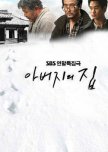
What an outstanding chamber play with two extremely gifted, stellar actors
Father's House" has two episodes only.What an outstanding chamber play, though!
With two extremely gifted, stellar actors. Choi Min-soo, already living acting legend at that time, and Kim So-hyun, then just in the starting blocks for fame. Choi Min-soo and Kim So-hyun deliver an unforgettably intense, mature performance and thus the authentically touching portrait of a dear, profound, yet often clumsy father-son relationship over a period of more than 2 centuries.
Male feelings are the focus. The heroes in "Father's House" are men of simple, humble origin - with either a gruff, rough and rumbling or withdrawn demeanor of hidden feelings that are rather reluctant and probably seldom felt, let alone shown. However, having feelings and showing emotions is allowed in this KDrama. It's difficult to deal with, yes, but it's possible. Necessary even.
Emotional sincerity has a liberating effect. The three male protagonists - son, father (and his adopted father) - actually become role models. "Father's House" came as a distinct year-end television show at the turn of the year 2009 - with reruns after that...
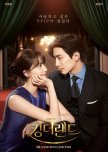
Maybe being so focused on success, King-The-Land almost lost track of the core of a KDrama´s heart
As far as I am concerned, "King the Land" triggers extremely ambivalent feelings. I'm still undecided whether to classify this KDrama as a Trojan horse or as a successful prototype AI product. In other words: is it deliberately engineered brainwashing (that at times comes very close to even insulting the human intellect), or is it the result of an AI (programmed for max audience share) as showrunner in its first, but surprisingly successful test run?"King the Land" is a Rom+Com. A fairy tale we have known and loved for generations. The unthinkable becomes possible: the hard-working girl next door finds Knight in Shining Armor - a Jaebeol offspring who can afford the luxury of not even being interested in the rich heritage of the conglomerate. Well, if you feel like something like that, you get a highly polished version of a cheerful, trivial (and conservative) love story that opens up clichéd insights into the upper segment of the shamelessly high-end luxury world.
Here my criticism. My irritation. Even annoyances.
--> These days, we can (and obviously have to) get used to product placement. That´s nothing new. However, "King the Land" undauntedly puts an almost obscene shovel on top of that. It goes so far that at times I felt like I was stranded in a 16-episode commercial, which I consider quite intrusive. Shameless. Apparently it can always be worse.
I rarely fast forward. But rarely have I fast-forwarded as much as in "King the Land". Usually, I'm ready to get involved in moments - looks, gestures, stand still, in my opinion all of that can be part of the dramaturgy. But here the long takes far too often serve a product placement or a Lifestyle-Statement being deliberately staged on the occasion, or some triviality that may or may not be considered nice, yet without any impact for the story. Just for fun, so to speak, because it is (supposedly?) so pretty. Most of the time it's about a haunting, almost mean display of a lifestyle in the highest-priced luxury segment, which will probably never play a role for the vast majority of the audience. Then I get angry. Not because the story is set in an exclusive social class, but because it is staged in such an oversized manner, while giving it a lot more screentime than would be necessary or coherent for the feeling and understanding of the story.
My understanding goes like this: The high-gloss, stylized luxury lifestyle of the absolutist elite hides a message between the lines that is addressed to all classes below: “”” You'll never get there! Forget it. Enjoy what you have. Make an effort, then it could even be a little more. Yet, be aware: WE play in another galaxy, light years away from you. Give up. Surrender. Let us do it all. Then it shall not be to your harm.”””
---> Additionally: The KDrama chooses a nasty mixture of proven dramaturgical elements and links them with another hidden, questionable message that might be hardly noticeable, yet effective.
There is the world of the employed, that so many people in the country (and elsewhere in other countries) share. In particular in South Korea this is often enough about an authoritarian hierarchy within a corporate structure. This includes almost as a matter of course: bossing around, exploiting, abusing, and some more exploiting. This goes through all instances. It is nothing new. This is everyday life for many.
Thus, a rebellious protest is always welcome in KDrama. “King the Land” also grabs into this box - courageously and with some humor as the hero immediately counters the frustration that nothing ever changes. He rebels. Dares to speak back. Pushes through, with vigorous means when necessary. And keeps the upper hand. How wonderful! … It's just too bad that he happens to be the chairman's son and can afford to do that... Here, and there, and almost everywhere...
So, the positive, rebellious (democratically inspired?) message turns into the (autocratic) opposite: “””Only those who swing the scepter of (monetary) power can change something, because they are the ones, who actually have something to say. The ones at the top. An this is, because they are at the top for a good reason, because they have the background, the stamina and the right genes to de facto be responsible for the rest.”””
“King the Land” never tires of throwing this message into the audience's eyes and ears - in all its possible epic breadth. In particular, embodied by the protagonist's stepsister and antagonist, but even by the protagonist's trusted secretary. Sure, our hero ticks differently, but (this is the harmless insight to take home with us): “””It's not the evil chairmen, but there is an economic reality with which all people who think and act halfway responsibly have to put up with. Period! These are given contexts that one cannot escape from when in such a responsible position. Ergo: THOSE up there are no worse than we down here. On the contrary: THOSE up there bear responsibility, we down there don't. And THOSE up there actually mean well with us. We can actually be happy: we are doing well after all...”””
Yes, it may be true, that many are better off than others, that they lead a more comfortable life than their parents or grandparents did. Nevertheless, I feel this message (that so often resonates in this KDrama) as one that basically wants to keep people little and hold their potential down. I personally don't like that.
Therefore: Is “King the Land” trotting along as a Trojan horse of the autocratic backroom masterminds, selling their notion for a modern absolutistic society?
Or - with a wink:-) - another assumption: Is "King the Land" an AI product? An AI, which with all its algorithms, its heuristic search for solutions and its logical conclusions, yet blind for socio-political nuances, reaches into the colorful pot of success guaranteed dramaturgical determinants, inflates those for even more success and breathes life into it with popular (success-guaranteeing?) mimes, music and light. However, one can sometimes get the impression that the heartbeat is missing. Its rather forced here and there. (Some even reproach the KDrama for lacking any cross-cultural sensitivity.)
In my opinion, the 'done with love' of this KDrama bobs back and forth between 'yes' and 'no'. A pretty face has to be enough, a harmonious tune, a touching gesture, a look, a kiss at the right time to make amends for the rest. Towards the end, the KDrama tries hard again, the amorous and yet tricky relationship dynamic emotionally comes to the fore a little more (e.g. as a relationship that isn't appropriate for the Heir), and some processes come across quite promising, to the extent that maybe something actually might possibly change about the cemented corporate culture of King Group. Nevertheless, being embedded within the absolutist brainwashing of the overall scenario, it loses some of its charm. (For me) A bland taste remains.
--> However, the good news at last:
I cannot say I totally wasted my time. If in between I was able to ignore all of the above-mentioned allegation (which was actually possible!), then the KDrama also delivered: a nice, clichéd love story in the Jaebeol milieu, with some cat-and-mouse games, without much depth, but with extra (!) cream. Simple as that. (By the way, some are already treating "King the Land" as the KDrama with the best kissing scene...)
--> Conclusion:
Maybe being so focused on success , “King of the Land” almost lost track of the core of a KDrama´s heart. However, at least a few within the production team obviously tried to put quite some effort into emotional finetuning, too.
So, I'm ambivalent. In spite even the unabashed style I criticized, I watched to the end. Not only out of professional curiosity. Despite all the indignation that inevitably spread through me again and again, at times I eventually enjoyed it, too. (Otherwise I would have dropped it - and then quite early.)
For all that, that's KDrama, too...
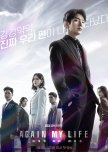
A bit of magical impetus needed to effectively counter autocratic networking and corruption
"Again my Life" is about a personal revenge campaign and at the same time a fight for the rule of law. David is once again up against Goliath. In his first life, the young prosecutor fails - and dies. But miraculously he gets a second chance. Eventually, in this second attempt he sophisticatedly works on a supportive network. ´David´ no longer fights alone."Again My Life" is part of a kind of law-and-order series invasion that swept over the KDrama world in 2022. The country seems to be crying out for justice. There is obviously a growing urge for real justice and effective punishment for the backroom masterminds, who are holding the true strings of power. A yearning for an end to eternal corruption. At the same time, there is great frustration that it seems so extremely difficult, almost impossible, to truly say goodbye to the old autocratic structures. There are laws, but they still don't seem to equally apply to everyone. For some time already, KDrama creatives (and their sources like webtoons etc.) have been fervently exploring the possibilities for a new horizon. In 2022, however, we see an unprecedented abundance, almost a climax, on a desperate path of effectively and/or morally defying the machinations of the powerful and the injustices and loopholes within the practiced legal/societal system. E. g. "Military Prosecutor Doberman", "Juvenile Justice", "Why Her", "Insider", "Doctor Lawyer", "Law Cafe", "The Empire", "May it Please the Court", "One Dollar Layer" and even "Extraordinary Attorney Woo" mercilessly bombard the audience with the same basic structural problems over and over again. In doing so, in their own individual way they juggle with the possibilities, opportunities and limitations that the legal system and the rule of law have to offer. And so does "Again my Life".
"Again my Life" is one of those productions that, bottom-line, choose a rather sobering, almost pessimistic perspective. A pessimistic tone might come from the fact that the protagonist actually needs a magical impetus to even get a minimum chance to clean up the ailing, corrupt and mendacious system: with a second life. Time is practically turned back and he gets the opportunity to live once more - to make it better with the advantage of his knowledge about connections and context.
Pessimistic might also be the fact that in the end the outlook is a questionable one. The audience may be satisfied in many respects, yet the basic problem can´t be thoroughly resolved - which I would think is pretty close to reality. The audience is mercilessly confronted with the question: is real democracy an illusion? Is democracy just a modern marketing gimmick that secretly hides the old concept of autocracy that has been tried and tested on the peninsula for centuries? A new, beautified skin for the old wine?
Is the message therefore a pessimistic one? Almost, but then no. Because even if it feels (and really) requires rather superhuman efforts (or circumstances) to counter the old autocratic domination effectively, it can individually still succeed. The evil resides in each individual human being - in our seductibility and venality. Everyone has to face that. Again and again. It's not something that's rooted in the system, but in people. People fill community with life. Everyone contributes to it. This is partake and participation. However, this is only possible with mature, responsible, self-responsible, upright citizens who cannot be bought - and thus degraded to bowed lackeys.
Autocrats (= powerful private individuals within the given democratic framework conditions) need appropriate lackeys who give them power by supporting them in undermining the existing legal system. Therefore: what may come across as a pessimistic message at second glance turns out to be a rousing warning finger: Be vigilant! Stay alert! Do not give up! Take your chance, every day! Prove to yourself that you are a sincere citizen: Self-determined. Independent. Responsible. This is the only way, democracy and the rule of law can actually work. Otherwise, we agree with those self-proclaimed autocrats - and then we don't have a right to grumble and complain... Against this background, "Again my Life" offers a compelling, exciting story and at the same time a vivid lesson in 'responsible citizens versus corrupt lackeys'.

Dynamic with high intensity caused by a sheer impossible tension between self-control & surrender
Revenge and KDrama obviously go extremely well together. TV productions are full of it. Actually, the revenge-motiv appears to be eternally young, being grippingly re-staged over and over again. "Eve" from the year 2022 is one of them - idiosyncratic, with an unmistakable coat of paint. "Eve" is about a long-planned vendetta against one of the most powerful Jaebeol clans in the land. "Eve" may join a long list of KDramas in the revenge genre. However, this KDrama scores with its very own charismatic aura.Premise of the revenge-plan against the most powerful: Perfection should be brought down by perfection.
Maximum control should be conquered by maximum control.
If one wants to control life to perfection, what remains is a lifeless, loveless shell. The price of power is transcending one's humanity. The little Jaebeol preschool daughter vividly fights the emotional price of power: she's already learning to play golf, but she's still peeing her pants - she´s overstrained ... Living the Win are her parents and grandparents: feeling and behaving like deities... The perfection of arrogance finds its direct expression in the control, the unscrupulous abuse and the brutal oppression of others. It goes hand in hand with self-control. Yet, the extent of the staging of their 'beauty' and ´perfection´ becomes downright repulsive and turns 'beauty' into its opposite - disgust.
The (dramaturgically chosen) valve grounding the human being in his earthly transient body is the dance. Here especially the tango. Exotic, erotic, heavy, deep, dark. The dance, the rhythm and the music bring you back into your own body. You have to listen to it - in tango to the body of the partner, too. So it's also about perfection here, but it consists of perfectly balancing your own body movements with personal authenticity, feelings and perception. THIS ´perfection´ draws from itself and is not at the expense of others. It culminates in a state of relinquishment of control - an altered state of consciousness. This condition only lasts for the moment of the dance, for the moment of encounter. (The Andalusian flamenco even coined its own term for bringing the dance to perfection: 'Duende'. This concept stands for an almost ecstatic state of consciousness that results from surrendering to the interplay of different brain areas, physical dance technique and emotion.) This moment makes you feel alive - intense, true, pure and innocent.
Throughout the individual episodes the revenge-hungry protagonist (a fantastic So Yae-ji) maintains an extremely high tension between the poles of maximum possible emotional self-control (in the service of the elaborate revenge plan) on the one hand and complete surrender to the sensual, invigorating movements of tango dance on the other. As the dance draws its power and charisma from the depth of the subjective, authentic emotional world, maintaining this tension is almost impossible. In fact the KDrama thrives on this very special dynamic (of the sheer impossible bearing of the tension between self-control and surrender). The result is a consistently high and gripping intensity.
I have read some reviews that accuse this KDrama of the (missing) chemistry of the protagonists or the ending or the resolution of the revenge motive, or even the revenge motive at all. Well, that is of course a matter of taste, too. In any case, I think the motive for revenge suits South Korean authoritarian society. Even today. I also consider the character of Kang Yoon Gyeom being drawn (and acted) extremely well - if the protagonist were sympathetic, open, tangible (and, if you like, more classically attractive), then the relationship dynamics would be more predictable. His repulsive, calculating side suits him. The fact that he is 40 already plus he doesn't really fit the image of classic male love interest suits the role, too. So do those very subtle nuances that reveal his other (touchable, needy) side. He is not extremely likeable. I agree. Yet, thus the provoking relationship with him subtly, unintentionally and unexpectedly develops its own dynamic. The ambivalence - attractive vs. repulsive - comes across quite well in my opinion. A strange chemical mixture, an unknown factor in the revenge plan equation. The reactions triggered by this in turn leads to an ending, that is what it is. ... Either way, revenge NEVER makes you really 'satisfied'. Because the pain of the old wounds or the memory never goes away, and the loss cannot be reversed either. On the other hand, with revenge new karma comes along and is guaranteed to be saddled on top of everything else, which one has to spoon up ... (This is usually overlooked when one sets out to take revenge...)
From my perspective, "Eve" is a haunting KDrama - with a lasting impression for sure.
It might also be worth mentioning:
The staging of the cruelty within the Elite world, their madness as well as the space given for the sexual dimension of the relationship are exceptional for a KDrama. However, these deliberately staged rather animalistic or even archaic aspects of the human species (which are assigned to the evolutionarily older brainstem or reptilian brain) set a sharp contrast to the hypocritical, superhuman self-portrayal of the Jaebeol elite...
---------------------- SIDE NOTE: --- Revenge motive and KDrama - for once wanting to control the elite 'authorities' who otherwise control the rest of the country ---
South Korea (with its comparably recent dictatorship history) is probably one of the places on earth where (perhaps a little bit more than in many other places where rule of law has already gained a somewhat more solid footing) rules still mainly apply to 'simple' people, the masses. The influential Elite, the Jaebeol in particular, namely play their private, own, elitist game. They are isolated from the rest of society. They seem to own the world. They live and rule as they please in their own orbit. When their world collides with the masses, it's annoying, but rarely turns out bad for them. They simply get rid of disruptive factors (or better: let others get rid of them). They enjoy all the freedoms. For them, ordinary people are actually of no worth. They can be substituted. They can be controlled by money or violence.
The state should actually be responsible for objective justice. But 'state' is made up of people. And the less binding the objective rules are handled by these people or the more rules can be bent, stretched and interpreted in favor of the 'perpetrators' from elite circles, the greater the subjective dissatisfaction and the stronger the desire of the 'victims' for vigilantism - the desire for revenge!
However, there is a difference between the desire for revenge/subjective justice and the realistic possibility of actually getting it. For the influential powerful, a few phone calls may suffice. The common people have to be a bit more subtle and sophisticated. Vigilante justice needs to be well planned. Especially if you want revenge on a person from the orbit of the Jaebeol. It costs time and money to be able to penetrate their world at all. In most cases, sworn helpers are also necessary. After all, it is to be expected that the same applies here: a plan is there to be discarded... Not everything can be foreseen. Details have to be improvised. The space for the unexpected can only be calculated with a degree of blurriness.
Against the background of authoritarian South Korean social structure, KDrama and revenge motif often and happily enter into a dramaturgically promising connection. It offers a vicarious valve for the emotions of the many ´victims´ of a corrupt system...
---------------------------------------
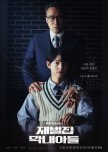
A snappy series, definitely worth watching.
"Reborn Rich" brings a breath of fresh air to the Jaebeol milieu. The story plays with "time and space" and at the same time deals with a highly topical inssue of the time: the meanwhile flattening turbodynamics of economic developments, which as a result of the Asian crisis positioned South Korea as a pioneer of the digitization age at the top of the world. The story comes at a time when the first melancholic fatigue is spreading in the country. It is fascinating how the creative industries at this point in time cheerfully holds up a positive, optimistic, innovative blueprint (i.e. the web novel “Youngest Son in the House of Jaebeol” was followed by the film adaptation as a series).The country's audience ratings went straight through the roof. After half the episodes they had already tripled and there was no holding back. The story hits the mark. The rights have also been generously released on international streaming platforms. The story about far-sighted, intelligent, courageous, ambitious and at the same time ruthless entrepreneurship draws wide circles and inspires worldwide. There is a lot of optimistic esprit in it, all about a spirit of growth that is actually predicted to be in danger of dying out in the form we are familiar with. In any case, lively ideas for innovation and intrepid capitalists rock the show in "Reborn Rich". Brilliant dramaturgical move: the patriarch of the very first hours of the Jaebeol meets with the young, new, digital zeitgeist. Charming. Tough. Mischievous. And in their mutual intention to increase profits far-sightedly, grandson and grandfather are one. The recipe works: relaunch and remake of the Jaebeol heroes from the very beginning. That gives hope and a good mood. Just in time.
In fact, the government actively decrees and supports innovations, subsidizes technical subjects at universities with large sums of money, cuts humanities institutes and puts 'all in' on the growth sectors. However, even though two-thirds of young people have a university education, 12.5 percent of the employable age group up to the age of 29 cannot find a job in the early 2020s. The last time the figures were so sobering was during the Asian crisis. And: society is aging. Although the gross domestic product is currently (in early 2020s) still growing, at almost 3% per year, it is far removed from the dizzying dynamics of the post-Asian crisis years and their GDP figures, which were three times higher.
South Korea's conglomerate founders still have hero status. But the proven system is exhausted. The following Jaebeol generations make life difficult for each other with inheritance disputes and live out their practically ennobled status with self-love. They have long since lost sight of promising, visionary growth, social responsibility and national well-being. New promising impulses are needed. "Reborn Rich" finds a successful form of expression for this difficult national emotional mixture.
Born into the Jaebeol Dynasty, the youngest grandson of the Soonjang Group's founder is not a spoiled Jaebeol, but an intelligent, hard-working, creative-thinking, adaptable young man who originally (before his sudden rebirth) was employed in 2022 as a CEO assistant in the service of the Soonyang Jaebeol (actually as a Senior Finance Manager) - he was not only quite smart and busy but got harassed a lot too. The founder of the company and now (in his second life) his grandfather was actually a role model for him. The ´grandson´ thus already knows his biography almost by heart. Reborn again under the Jaebeol sky he becomes a clever lawyer and investor who can hold a candle to his 'grandfather' at eye level.
(Admittedly, there is somehow also a bit of cheating, because the youngest grandson distinguishes himself with his considerable entrepreneurial genius based on knowledge from the future, which gives him not inconsiderable advantages in competition with the rest of the Jaebeol clan...)
Nevertheless, the ambitious fake Jaebeol grandson would be one that the country needs today. Socially responsible. Grounded. Visionary. Brave. WITHOUT (!) the filth of the otherwise mostly elitist Jaebeol offspring. Instead, WITH the fearless, highly motivated and visionary esprit and good/lucky timing of the first Jaebeol, who brought prosperity and prestige to the country in the people's narrative.
The issues, challenges and problems facing the Soonyang Group mirror an entertaining historical outline of South Korea's turbo-dynamic development phase, which led the country into the highly digitized consumer paradise of the last almost 2 decades. On top of that, Justitia may also take some space in her difficult fight against corrupt networks.
In "Reborn Rich" old energy meets the current moral of the times and, practically in a combative spirit of sport, struggles about the constructive economic attitude for new, forward-looking impulses. "Reborn Rich" promises plenty of fun, sanity and series enjoyment against a serious background. The poignantly portrayed grandpa-grandson dynamic is also brilliantly cast with Song Joong-ki and Lee Sung-min.
A snappy series, definitely worth watching.
-----------------------------------------
SIDE NOTE: --- Background: Asian crisis in the 1990s and the IMF in South Korea ---
The Asian crisis of the 1990s brought South Korea to the brink of national bankruptcy. Banks, as well as large and small companies had to file for bankruptcy, many people lost their jobs, their assets and their prospects.
In South Korea, however, there is significant talk of the IMF crisis. That's because people saw the tough conditions imposed by the International Monetary Fund (IMF), which amounted to massive interventions in the country's existing structures, almost as colonialist attacks - like the Japanese did back then. In fact, the IMF provided South Korea with the largest loan to date ($57 billion) to save the country from ruin. At the same time, the people, motivated collectively by patriotism, made unique sacrifices that went as far as selling their own gold in the service of national gain and the consistently disciplined renunciation of export articles. The combination of financial help from outside, internal discipline and willingness to make sacrifices as well as targeted economic restructuring measures maneuvered South Korea out of the recession at amazing speed and torpedoed the country into the unimagined prosperity (on credit card basis) of a first-class digitalized consumer society. The country is still living from this today, but the air is slowly getting out...
-----------------------------------------
PS:
Never mind the ending...
it could be this
or that
or something else,
here it is this...
quite mind blowing...
whatever...
the circle is round after all...
and the journey is the reward, isn´t it...
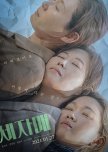
An all round ambitious work. (However, 'beautiful' is different...)
"Three Sisters" has won numerous international awards. 12 to be precise. But I'll say it right away: it's overall rather painful to look at. It's even painful to the point. Again and again. So true-to-life that it even hurts some more. Some might seem crass being focused that intensely. But at the same time it's not that crass, actually. It is the normality shining through behind the story, that is almost the most painful part of this KMovie.Three sisters, each in their unique way coping and trying to live with the pain that forces their souls into a corset from which they don't know how to free themselves. They live with their trauma. Are alone, captured within their traumatic past. They don't talk about their trauma. They are emotionally rather surviving than actually feeling alive. They are still trapped in their unresolved past today, because they don't recognize or acknowledge the corset as such. But as long as that doesn't happen, they can't put it off and thus learn to approach life, experience life without a corset...
Haunting portraits of women! So intense that the pain reaches the audience, as vicarious emotion so to speak. Fantastic actresses. An excellent KMovie in all aspects... lighting, scene, shot, cut, etc. too... An all round ambitious work. (However, 'beautiful' is different...) About a topic that is one worldwide. About a topic that is also a big one in South Korea with such a strong patriarchic family hierarchy. A trauma that far too many people on this earth learn to endure. Have to cope with one way or another. Suffer from for the rest of their lives. Being ashamed of it. Yet, actually rather being ashamed of themselves. Because they can't explain the incomprehensible in any other way. Thus they remain trapped in the ineffable.
No movie for every mood.
Yet, when the time is right, then definitely worth it.
------------------------------------------
Spoiler alert:
Here the unspeakable is spoken out at last. There is an unexpected showdown that has it all. Something that is liberating. Yes, it hurts, again – just like cold fingers starting to feel the warmth… True enough, healing is a process. (Life hardly becomes smooth&easy overnight.)
Acknowledging the corset. That is the first step. Feeling it, joggling it. This is the next step. Then get on the trail of your own feelings. Find some expression for it. Surrender to your vita and what you sur-vived so far. Let go of the corset, by now being grown and old enough to stand by your side. Grab your inner child´s hand and allow yourself to be who you are, embracing the feelings you have. All of them. The anger, helplessness and desperation, too. Be proud of who you are. Daring, step ahead. Longing to be. Being free to be. Being palpable. Being. Sharing. Communicating... giving life a second chance...
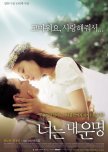
Magnificent balancing act of intense emotions. Old school production without high-gloss polish.
"You are my Sunshine" is the international title of this KMovie from 2005 - named after the US country song of the same name from the 1930s. However, the original title is "You are my destiny". Regardless, both are working. The Plot is based on a true story that happened in Yeosu around 2001.It's about prejudice. About the socially doubtful binding norm and where it is actually coming from. And it's about a man who, fortunately, cares less about what others say and trusts more in what he feels and believes is right. So this is about a positive role model of a man - a man who noticeably sets himself apart from the crowd who dominate the image of men here: Men who buy women, men who buy women abroad as wives, men who beat women without hesitation, men who infect women with AIDS (and don't tell them), men who won't let go of women, see them as possessions and unrestrainedly abuse them... There are the many completely 'normal', 'socially valued' men , husbands, fathers, whose behavior is simply outrageous. As if it were a matter of course, they set the standard of what is right, they set the tone... and yet deny any responsibility.
It's also about love. The sunny, courageous, positive message is embodied by a man who loves sincerely and unconditionally. However, he is generally considered naive. The cattle farmer is considered a hillbilly and a bit peculiar. Not just because he talks to his cow, but because he keeps the word he gave to the woman he loves and stands by what he feels. He is different. (Although, his attitude towards life, women, animals and nature could be considered quite progressive, too...)
And the woman? The female Protagonist could see herself as a victim. On top of that, she might be ashamed of her life. But despite everything that made her tainted and even 'leper' in her life as a prostitute, she was able to keep her soul pure inside. She is straight and clear, she doesn't deceive herself and above all she doesn't get her hopes up, because she knows life as it is - for women like her.
Life in the country is plain, ordinary, vulgar, simple. Also sensually grounded in the changing seasons. Although the ideal of pure, white skin is held high, the story instead focuses on the stigma of the tainted and tanned skin. The everyday scenario of bruises and violets from beating men as well as the darker Filipino and Vietnamese (versus light, pure South Korean) skin of purchased wives thematically dominate here. Finally, it´s about fear of AIDS (spots). That's the rural reality.
Nevertheless, there is this down-to-earth man who puts love above everything else – in good times and in bad... he´s honest, sincere, reliable, devoted, lovable. And there is this woman who can and wants to get involved... until her past catches up with her...
Two wonderful leading actors. Pure KMovie. Intense. Feels lifelike with a deep impact. A magnificent balancing act of conflicting emotions.
Old school production, though. Without high-gloss polish.
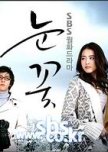
Timelessly dealing with crucial mis-communication issues in families. (Here: single parenting, too)
In a way, the title "Snow Flower" symbolically refers to a time when the love of the protagonist´s parents was still full of happiness. However, the KDrama actually comes along as a study about communication difficulties and misunderstandings between a single mother and her young daughter where the daughter is struggling with the question: why can't she grow up with mother AND father, like other children do? There must be someone to blame for this – The father? The mother? Or even herself... "Snow Flower" dates back to 2006, yet dealing with crucial educational issues in a timeless manner.In KDrama style, the story is enriched with a variety of dramaturgical colors. However, the sticks and stones are (unfortunately) not all absurd. This and That may be culture specific, but overall I think "Snow Flower" offers a wonderful (though not so fun to watch) study about mis-communication, which are (varying in intensity and severity) experienced by many families (and relationships) all around the world. Go Ara won Best Actress at Baeksang Arts Awards, i.e. for her great performance as a rebellious daughter. At her side strong as usual: Kim Hee-ae.
SBS tackled a topic that washes unloved laundry, because in South Korea family issues in education are a private matter, happening behind closed doors and being nobody's business. Actually, the family here is quite progressive. The mother is a single parent and successful writer, dating an art professor. Two neighbouring families, with their doors always open for each other – practically an extended family with no room for secrets.
Yet, a progressive attitude towards life alone has very little to do with the communication traps in family life. The mother falls into these traps, and so does the daughter, having inherited her mother's temperament. It's sometimes painful to witness, how one or the other keeps reacting to another and another red flag, blindly fighting back within seconds and thus creating conflicts that cannot be resolved, as the explosion has already been set off before communication is possible.
The offering of this KDrama: while we have to listen to their fights, we are also do participate here and there, in what they are quietly thinking and feeling, too. Thus, "Snow Flower" does not ONLY want to stage DramaDramaDrama with this conflictual mother-daughter relationship, but is also committed to an educational mission. (You may also want to check the side note below.) The background is embedded in the world of the filming industry and rooted in the handicap of single parents and divorced families.
So in "Snow Flower" the deeply disappointed and insecure daughter pushes her thing through, while the mother doesn't succeed in letting go of her well-meant (those are the worst) templates. Up to the bitter end. That's impressive. Startling, too.
p.s.:
Some may say – and I agree – the mother-daughter communication is most of the time so off the charts. It's scary sometimes. Nevertheless and actually because of that, (in my opinion) the script and the actresses do their job quite well. (However, one does not have to like it...)
Due to the given occasion: here is a side note on the communication problem between Dami and her mother, which (unfortunately) many families struggle with more or less severely. (By the way, as such conflicts are happening within the ´best´ families, professional coaching is available – and might have been a solution for Dami and her Mom, too.)
------------------------------------------------------------------------------------------------------------------------------------
SIDE NOTE --- on the widespread communication problem between parents and children ---
Even though opposition is rather due to attitude, position or opinion and is nothing personal as such, emotionally this can be hardly distinguished in the heat of the moment. How liberating it would be, if both parent and child would listen carefully, ask questions, and try to reach mutual understanding. Some call it communication…
In many conflicting situations, it is first and foremost about being noticed and understood by the other person. Thus you have to show yourself. Self-confident in who you are and what you want or are afraid of. As a result, the conflict resolution in the matter is actually not that difficult anymore.
Win-win, so to speak.
(Easier said than done… Most of the time, a more or less pronounced self-doubt, for example a thorn of guilt or inferiority, subtly gnaws at the foundation of a sincere, self-confident presence - in parents and children alike.)
However we my look at it, most of the time we have to do something for mutual understanding. Yet, more than other relationships, mother and daughter are probably predestined to believe that they can take this 'understanding' for granted without a process of understanding – after all, it is about 'their own flesh and blood', isn´t it.
Incorrect! These are two individual people with their own will, their own memory, their own experiences, their own desires and their own interests. Blood/love aside... Thinking that you know the other person well does not replace the need to invest time, patience and a willingness to cooperate in understanding again and again.
'Are you making a relationship statement here?', ´Are you trying to be practical?'. ´Is that a request?´, ´Do you actually want to reveal something about yourself right now?´, ´What do you want?´, ´What do I want?´ … All this requires consideration. Again and again! And 'again and again' means, strictly speaking: 'often' or even 'constantly'. After all, parents and their children usually share the apartment, show themselves without make-up in many respects, see each other first and last every day and plenty in between. There are many chances of contact/friction. Annoying communication can get on your nerves, yes. You have no time, you are stressed already, you are not in the mood...
Consequently we mostly choose a quick judgement, because that is more economical. A preconceived notion, a prejudice that doesn't seem worth trying to test. But in doing so, we might be hardening the fronts, and thus the roller shutters go down. There is no forward (e.g. solution) and no backward (e.g. bonding). Lose-lose, so to speak.
"Snow Flower" impressively portrays how such confirmedly unresolved conflict situations encourage the child (here the daughter Dami) to finally repay the parents (here the mother) at some point. This crucial moment was actually (as so often) triggered by a key event.
Suppressing her need to be close to her mother and to wanting to feel connected and loved, Dami now deliberately treats her mother the way she FEELS treated herself (without having confirmed any of that, of course). The need and longing hasn't gone away. It's just relegated to an unconscious level for the time being. Consciously and outrageously she rather strikes back in defiance, deliberately wanting to hurt – just as she feels hurt. "I don't do any university entrance exams". "I don't even want to study." "Then I'll just move out." And underneath (pronounced or not) linger disappointment and self-doubt, e.g. "I'm probably not worthy of being loved." "It would be better if I didn't exist at all"…
Dami navigates between the roles of perpetrator and victim and doesn't get what she actually wants in either of them. Yet, both are ROLES, and not her true SELF.
Additionally, in her newly discovered role as a perpetrator Dami even worsens the situation in an almost fatal way, because such a defiant reaction is considered extremely immature by parents. In the case of Dami´s mother, this inevitably leads to the conclusion that she should actually take more even control. However, by boldly taking her parenting responsibilities back into her hands, she only adds fuel to the fire.
The past that led to this dilemma is long history for both of them. Both feel they did their best. In terms of communication, however, this is not the case. They may have 'meant well' for the sake of peace, but they didn't communicate what´s actually on their MIND. Well, what´s on my mind is 'Mine' and not 'Yours', until I let you know.
To disagree is not the problem. Different perspectives and intentions are normal. Unfortunately, a cooperation oriented process of communicating is not...


 9
9 37
37 15
15


















